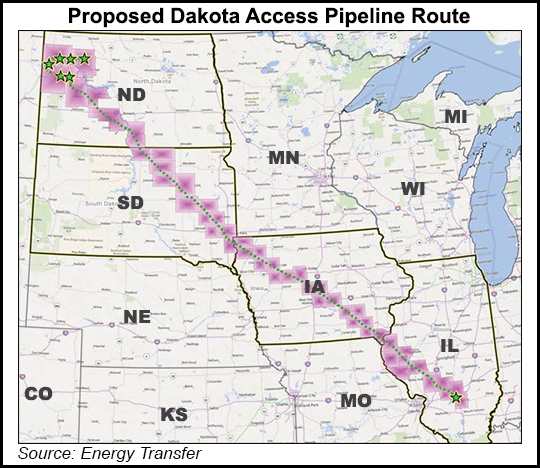Shale Daily | Bakken Shale | E&P | Infrastructure | NGI All News Access
Dakota Access Oil Pipeline Continues to Receive Flak Along Iowa Route
While none of the flak is likely to unseat the proposed 1,172-mile oil pipeline from the Bakken in North Dakota to market hubs in Illinois, Iowa regulators on Friday reported continued complaints and grievances against the elongated construction route of the Dakota Access pipeline.

Besides four complaints — two already dismissed — filed with the Iowa Utilities Board (IUB), there are three others regarding the oil pipeline project that are all in the “early stages of investigation by the IUB staff,” according to a board spokesperson in Des Moines. For the other two unresolved complaints one is awaiting an IUB staff review of Dakota Access’ response and the other, an informal complaint, is waiting for the parties to consider a board-recommended resolution.
“The IUB follows the complaint procedures established in Iowa Code and the board’s rules, which can be found in the state’s administrative code for investigating complaints filed with the board,” the spokesperson said. “The IUB process for investigating any complaint or grievance regarding the Dakota Access pipeline will continue until the pipeline is constructed.”
Despite some federal court action related to a part of the route near the North-South Dakota border, construction of the $3.8 billion, 30-inch diameter pipeline continues in the Dakotas, Iowa and Illinois. The U.S. Army Corps of Engineers (USACE) recently approved most of the remaining federal permits required for ETP to complete construction (see Shale Daily, Aug. 17).
For any of the concerns raised with the IUB by landowners and others, the board staff initially investigates the claims by talking to the parties involved. Subsequently, the staff will dismiss the allegations or set an informal and formal complaint process based on the initial findings.
Iowa, however, also allows for complaints being lodged through the network of county inspectors assigned to the Dakota Access project. Inspectors are selected by the respective county board of supervisors.
“Each inspector is to inspect the properties during construction and be present on the site at all times at each phase and separate activity of the opening of the pipeline trench, the restoration of underground improvements, and backfilling,” said the IUB spokesperson.
While state regulators in the other three states approved the oil pipeline project relatively quickly (see Shale Daily, Jan. 25; Dec. 29, 2015), the IUB took a measured approach that included many conditions (see Shale Daily, March 3).
Last February, the IUB concluded four days of public hearings on the proposed interstate oil pipeline and set open session meetings on the project last March. An initial conditioned decision was made later in March, but it wasn’t given ultimate final approval — on a split 2-1 vote — until June (see Shale Daily, June 7).
© 2024 Natural Gas Intelligence. All rights reserved.
ISSN © 2577-9877 | ISSN © 2158-8023 |
